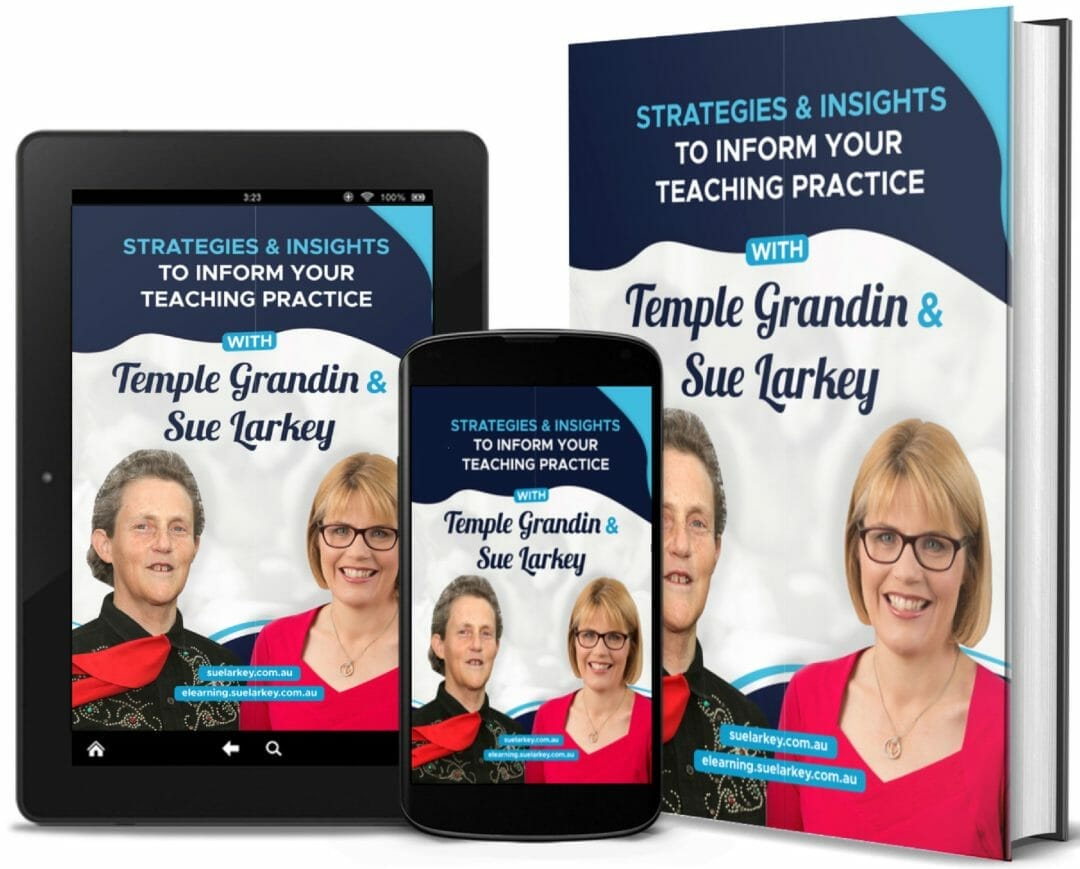Sue Larkey Blog
Helping you “Make a Difference”


Tips, Strategies, Time Savers and Inspiration to help make difference for a child with an ASD in your class, home or community.
Episode 267: Top Tips for Early Childhood Educators – Where to start and what to do
Top Tips for Early Childhood Educators - Where to start and what to do Teaching Strategies for Neurodiverse StudentsWhen working with any child with ASD it is critically important that the programme implemented is realistic, both for the child and for the family. By realistic I mean setting everyone up for (achievable) success and that everyone across all environments has the time to implement it. I believe the best way to create a realistic programme is to only address one or two ideas at any one time. I recommend in the early years you always have visuals of the goals you are working on in a prominent place (e.g. fridge or preschool office) so ALL people engaging with the child know the week’s two goals. Over the years I have found by displaying the goals ensures consistency and everyone creating opportunities to reinforce the goal. As children with autism spectrum disorders are highly individual, not all strategies may work with every child. If you find this to be the case,...
Episode 266: Helping PDA Teens Thrive: A Guide for Parents & Educators
Helping PDA Teens Thrive: A Guide for Parents & Educators Helping PDA Teens Thrive Strategies for Teaching PDA Students✅ Show genuine interest in a teen's interests without an agenda✅ Use the "GPS" approach: stay calm and redirect without reacting to anger✅ Offer choices and suggestions rather than direct commands✅ Provide "get out" options for social situations to reduce anxiety✅ Use various communication methods (e.g., Zoom, email, voice notes) to accommodate preferences✅ Create a safe space for honest feedback and expression✅ Avoid making assumptions based on past behaviors or interests✅ Stay steady and consistent in your support, even when faced with challenging behaviors✅ Recognize and respect the need for autonomy in PDA teens✅ Educate extended family and professionals about PDA to create a supportive networkPathological Demand Avoidance (PDA) in the Classroom: Understanding and Teacher Strategies for EducatorsDownload 'Laura Kerbey's 10 top tips for supporting...
Episode 265 – Getting Your Neurodiverse Student Ready for Secondary School – Your Transition Guide
Transition from Primary to Secondary School This Weeks Podcast is an interview with the Joan Shanahan: Joan has been involved in education all her life and experienced from early childhood to tertiary. She finally worked as a consultant in 24 schools in northern NSW before moving to the Sunshine Coast and establishing her business Behaviour Solutions 247. She brings to this Podcast over 20 years of experience in developing transition plans for students moving from primary to secondary school. Discussed in this Podcast: ✅ When to Start Transition ✅ How Long should you do Transition ✅ Must Do for successful Transition ✅ Ideal to Do as part of Planning ✅ Extra Ideas to support Transition ✅ What do to if Transition wasn’t Successful ✅ Plus information on Vaping, Catching the Bus and more More Tips and Information from Joan Shanahan https://behavioursolutions.wixsite.com/australia/home 1. Must doThese are the MUST DO for Transition to Secondary School: Visit the school...
Episode 264: Teacher Assistants Toolkit: A Comprehensive Guide to Supporting Neurodiverse Students
Teacher Assistants Toolkit: A Comprehensive Guide to Supporting Neurodiverse StudentsTeacher Assistant Neurodiverse SupportDiscussed in this Podcast: ✅ Implement a "you have a go, then I'll have a go" approach to encourage student independence ✅ Use visual cues like highlighters to break down tasks into manageable parts ✅ Teach coping strategies such as deep breathing or offering choices for self-regulation ✅ Create a cup system (green, yellow, red) for students to signal their need for help ✅ Utilize students' special interests (e.g., number plates) to engage them in learning activities ✅ Encourage peer support by teaching students to ask classmates for help before turning to adults ✅ Provide preventative breaks and movement activities throughout the day ✅ Use timers to manage student expectations when waiting for teacher assistance ✅ Implement a "see two, then see me" policy to promote problem-solving skills ✅ Adapt support strategies based on the time of day when students are...
Episode 263: Teacher Assistant Q & A : Addressing Common Challenges for Teacher Assistants
Teacher Assistant Q & A :Addressing Common Challenges for Teacher Assistants Teacher Assistant Addressing ChallengesAlthough this is questions from Teacher Assistants, I think you will find this Podcast full of tips and strategies for School & Home too Discussed in this Podcast: ✅ How to help students who don’t like making mistakes ✅ How to help students who don’t like to lose a game ✅How to ensure you are not “helping” too much when supporting a student ✅How to help an absconder? ✅How to help students who “shutdown” ✅How to accommodate a student who is stamping his feet as a stim? ✅How to assist a student with dysgraphia, with no technology at all ✅How to work with teachers and be collaborative? ✅How to help staff and students understand PDA? ✅How to support non-verbal children communicate? And so much more CELEBRATE TEACHER ASSISTANT APPRECIATION WEEK I have a special week planned for our TAs/Angels Nominate an Angel or Team here to win Flowers sent to the school....
Episode 262: Putting Pencil to Paper: Overcoming Handwriting Hurdles for Students with Autism & ADHD
Putting Pencil to Paper: Overcoming Handwriting Hurdles for Students with Autism & ADHD handwriting strategies for autismDiscussed in this episode In this podcast Sue discusses ✅ Understanding the Unique Challenges of Handwriting for Students on the Spectrum ✅ Building Fine Motor Strength and Coordination Through Play ✅ Simple Classroom Accommodations to Support Handwriting ✅ Modifying Writing Tasks to Boost Confidence and Engagement ✅ When Typing May Be the Answer: Bridging the Gap with Technology Learn Handwriting tips for Students with Autism Today!RECOMMENDED RESOURCES BY OCCUPATIONAL THERAPISTSDOWNLOAD FREE PAMPHLET FOR MORERECOMMENDED...
Episode 261: What Clinical Psychologist Danuta Wishes People Knew About Girls On The Spectrum
Helping Autistic Girls Thrive in School: Insights for Educators Supporting Neurodivergent Girls in SchoolLearn about Girls on the Autism Spectrum Today!Discussed in this Episode: ✅ Use books like "I Am An Autistic Girl" to help explain autism to girls after diagnosis ✅ Create opportunities for downtime at school to help autistic girls recharge ✅ Facilitate structured social interactions, like Lego challenges, during breaks ✅ Be aware of perfectionism and fear of mistakes in autistic female students ✅ Offer discreet ways for autistic girls to ask for help in class ✅ Encourage parents to give their daughters space after school before asking questions ✅Help autistic girls explain their diagnosis to friends when they're ready ✅ Create safe spaces or quiet areas for autistic girls during lunch and recess ✅ Be observant of non-verbal cues, like facial expressions and body language ✅ Show genuine interest in autistic girls' special interests to build rapport SUE'S RECOMMENDED...
Episode 260: Stretching Beyond Comfort Zones: Temple Grandin’s Insights for Educators
Stretching Beyond Comfort Zones: Temple Grandin's Insights for Educators Temple Grandin teaching insights Subscribe to this podcast via your favourite app Join my newsletter for more awesome information about ASDTemple Grandin's experiences provide invaluable insights for educators working with students on the autism spectrum, emphasizing the importance of "stretching" – encouraging students to try new things just outside their comfort zones. This approach empowers students while gently pushing their boundaries, allowing them to feel in control. Implementing these strategies can create a more inclusive and supportive learning environment, helping students to stretch beyond their comfort zones and reach their full potential. What you will learn: ✅ Temple's experience at her aunt's ranch, which led to her career in the cattle industry. ✅ The importance of having a name on a room door to provide consistency and reduce anxiety. ✅ Using a cattle chute as a calming mechanism during...
Episode 259: Temple Grandin Free Ebook – Strategies & Insights to Inform Your Teaching Practice
Temple Grandin Free Ebook - Strategies & Insights to inform your teaching practice TEMAPLE GRANDIN AND TEACHING STUDENTS WITH AUTISM Subscribe to this podcast via your favourite app Join my newsletter for more awesome information about ASDThis FREE Ebook and Webinar are focused on Teaching Students with Autism Spectrum - Strategies & Insights to Inform your Teaching Practice with Temple Grandin and Sue Larkey. They are designed for Educators to use lived experience and evidence-based research to increase engagement and participation for their students with Autism Spectrum. The free Webinar is also the first lesson in my Temple Grandin and Sue Larkey Course - check it out if you enjoy the Webinar! Another FREE E-book with 100+ Tips & Strategies! Download the free E-book so you can read along while I explain in this week's Podcast. What you will learn: ✅ An Inspirational Story: Strategies Behind Temple Grandin’s Amazing Successful Life. ✅ The 9 Compelling Reasons To Use...
Episode 258: Eliza Fricker – Can’t Not Won’t go to school. Insights about PDA from Eliza Fricker
Eliza Fricker - Can't Not Won't go to school. Insights about PDA from Eliza Fricker Insights on PDA with Eliza FlickerLearn about PDA. The podcast discusses PDA (Pathological Demand Avoidance) and its impact on individuals, particularly children. It emphasizes the importance of creating a suitable environment for individuals with PDA to thrive and highlights the positive qualities of individuals with PDA.Discussed in this episode: ✅ The diagnosis that made Eliza realise why she had to parent differently ✅ Importance of consistency instead of planning for PDA ✅ Classroom strategies for PDA ✅ Focusing on Fun and meeting the child where they’re at ✅ Strategies of low-demand parenting ✅ About Eliza’s best selling book: Can’t Not Won’t Recognising Individual Progress: Understanding that every child's growth trajectory is different. Building Relationships: The significance of rapport with children, especially those with PDA (Pathological Demand Avoidance). Non-traditional Learning...
Episode 257: Insights and Tips for Navigating Work : Yenn Purkis shares Lived Experience
Insights and Tips for Navigating Work : Yenn Purkis shares Lived Experience neurodivergent job interview preparationDiscussed in this episode Today I will be interviewing Yenn Purkis. Yenn is an autistic author, speaker and advocate. Yenn is an avid writer not only writing fabulous books but also has a wonderful blog (check it out here). Yenn has authored numerous books covering everything from Women with AS, Mental Health, Education and more which are all available on my website. I find Yenn’s writings and weekly quotes a source of insight, understanding & inspiration. Yenn has a diagnosis of Asperger Syndrome and atypical schizophrenia. For me, Yenn’s sharing of their mental health challenges helps me support the students I know and their families. Two years ago Yenn affirmed that they are non-binary and changed their name from Jeanette to Yenn. I am just letting you all know, as many of their books are under the name ‘Jeanette Purkis’ and I would hate for you to...
Episode 256: Fostering Self-Advocacy: Dean Beadle on Autistic Identity in Education
Fostering Self-Advocacy: Dean Beadle on Autistic Identity in Education Embracing Neurodivergent IdentityDiscussed in this episode Today I will be interviewing Dean Beadle! Dean has toured the UK and the world for fifteen years as an autistic speaker and trainer. Dean is also a proud promoter of the autistic voice, encouraging and empowering other autistic people to share their experiences and insights too. I am a huge fan of Dean's work and have toured with him in the past. He is a great friend and inspirational speaker and I'm sure you will all enjoy listening to Dean's personal experience and insight as much as I did! In this episode Dean meantions the Department of Autistic Research and Technology (DART) who are affiliated with Edinburgh University and have large amount of research on autism and people with autism. Dean mentions a small part of their research in this episode and I found it absolutely fascinating so have linked the group here in case any of you would also like...











